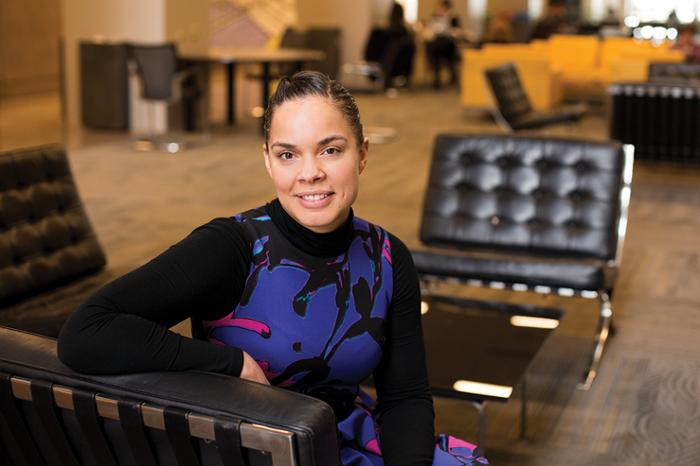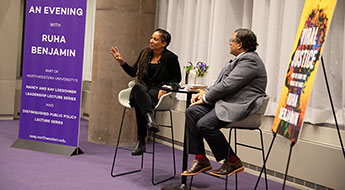Law and Bias
IPR associate Destiny Peery brings interdisciplinary approach
Get all our news

Law professor and IPR associate Destiny Peery explores the intersection of law and issues of race and discrimination.
Law is built on precedent, the idea that past court rulings should inform how future cases are interpreted. So how can you move a field mired in tradition and history to consider new ways of thinking about complex, evolving issues?
“Yes,” says Destiny Peery, assistant professor at Northwestern’s Pritzker School of Law and an IPR associate. “It’s a big ask.”
But Peery is used to pushing the boundaries of disciplinary discourse. A JD with a PhD in social psychology, Peery explores the intersection of law and issues of race, identity, equality, and discrimination. Her scholarship seeks to understand how the law defines and understands discrimination, with one goal being to determine how legal institutions can catch up with dynamic perceptions of race and ethnicity.
“I’m interested in what we mean by ‘race,’” says Peery. “I’m interested in questions about what the underlying concepts actually mean and how we come to an understanding. These are hard questions, and the consequences are a lot easier to understand because they are quantifiable. But the conceptual question is the less-researched question.”
Implicit bias is one of those challenging conceptual areas.
Peery says that this bias often operates outside of awareness and reflects associations that individuals hold about people of different races, genders, or sexual orientations, for example. These associations can be informed by stereotypes; some are flattering, others less so. Because these biases can be nonconscious, their influence on behavior and decision-making can go largely undetected. Case in point: the notion that all black men are criminals. “In criminal law, the discussion has focused overwhelmingly on police,” she says, “but there have been discussions about how these automatic associations can influence how lawyers and judges view cases, how they interact with clients, how a juror might perceive a witness.”
Peery knows about such discussions. She regularly conducts implicit bias training sessions at the request of police departments, legal groups, and businesses. When she does, she usually finds that many people don’t know what implicit bias means and are hesitant to believe that everyone—including themselves—is biased.
Perhaps the hardest truth for many to accept is that implicit bias has been subject to academic discussion for decades. “It’s only now, after 30 years of being talked about in social psychology, that it’s really starting to be talked about as a potential way of understanding race, inequality, and discrimination in the law among legal scholars, let alone amongst practitioners,” Peery says.
Peery knew this was coming. Raised in Minneapolis, she knew early on that she wanted to become a research psychologist. She declared her social psychology major during her first semester at the University of Minnesota-Twin Cities, with plans to attend graduate school. She spent the summer before her senior year in Chicago as a research fellow for the American Bar Foundation (ABF), which shares an address with Northwestern Law. There, she worked on the Arizona Jury Project, a years-long study that delved into how juries behave during trials. Working with project lead Shari Seidman Diamond, a research professor at the ABF and a Northwestern law professor, Peery found an archetype: Diamond had a JD from the University of Chicago and a PhD in social psychology from Northwestern.
“She said, ‘If you’re interested in this intersection between psychology and law, you should consider getting a law degree in addition to getting a PhD,’” Peery says. “I was interested in the real-world issues of race, identity, and equality. If I thought about another context where my research would have an impact, the law and policy seems pretty obvious.”
Peery took the advice to heart, joining Northwestern’s JD/PhD program, which Diamond directs. “Starting out with a background in psychology, she is building a unique cross-disciplinary connection, putting together the pieces of race, psychology, and law,” says Diamond, the Howard J. Trienens Professor of Law and a professor of psychology.
In a forthcoming paper, Peery focuses on the law’s refusal to define race and its significance in the context of race-conscious law, such as anti-discrimination or employment discrimination laws. She also continues to examine implicit bias and its relevance for law. The biggest challenge remains getting the law to acknowledge and accept these applications, she says.
The good news? Peery has more than enough material to explain why moving race and law forward is a good idea. “Every paper or project I present, everyone says, ‘You could write five papers on this,’” she says.
This article was originally published by Northwestern Research.
Published: February 4, 2017.


